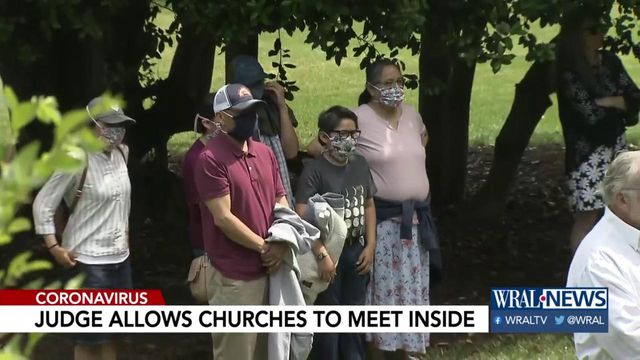Federal judge allows NC churches to meet inside
After filing a lawsuit against Governor Cooper's order allowing gatherings of only 10 people or less, church leaders won a temporary restraining order, allowing them to meet in larger numbers for worship for at least 14 days.
The ruling was issued Saturday by US District Court Judge James C. Dever III. He wrote, in part:
"There is no pandemic exception to the Constitution of the United States or the Free Exercise Clause of the First Amendment. Plaintiffs have demonstrated that they are likely to succeed on the merits of their Free Exercise claim concerning the assembly for religious worship provisions in Executive Order 138, that they will suffer irreparable harm absent a temporary restraining order, that the equities tip in their favor, and that a temporary restraining order is in the public interest. Thus, having considered the entire record and governing law, the court grants plaintiffs' motion for a temporary restraining order.
"No constitutional right-including the right of free exercise of religion-is absolute. ... Individual liberties, "under the pressure of great dangers," may be reasonably restricted "as the safety of the general public may demand.
"This court does not doubt that the Governor is acting in good faith to lessen the spread of COVID-19 and to protect North Carolinians.But restrictions inexplicably applied to one group and exempted from another do little to further these goals and do much to burden religious freedom."
Cooper said his Phase One order of limiting indoor gatherings to 10 people or less is to help prevent the spread of COVID-19 during this time. He said he's concerned church congregations gathering in large numbers for a length of time indoors could lead churches to "become hotspots" for contagion.
Some church leaders, however, feel that since the Executive Order for Phase One allows most businesses to let people inside, as long as the number doesn't exceed 50% of the building's fire code capacity, churches should not be excluded.
Church leaders file suit against executive order
On Thursday, multiple conservative Christian leaders sued Gov. Roy Cooper, asking a court to throw out his restrictions on indoor religious services. On Saturday, they won a temporary restraining order.
They argued Cooper's guidelines restricted their constitutional rights to worship freely.
The churches that sued Gov. Roy Cooper, fighting his executive order limiting indoor church services, have won a temporary restraining order against that executive order from a federal judge. Therefore, for 14 days, Cooper's guidelines cannot be held against them.
The judge stated, "There is no pandemic exception to the Constitution of the United States or the Free Exercise Clause of the First Amendment."
"Plaintiffs have demonstrated that they are likely to succeed on the merits of their Free Exercise claim concerning the assembly for religious worship provisions in Executive Order 138, that they will suffer irreparable harm absent a temporary restraining order, that the equities tip in their favor, and that a temporary restraining order is in the public interest," stated the judge.
Governor Roy Cooper responds to lawsuit
Governor Roy Cooper's spokesperson responded to a court ruling today on religious services during COVID-19:
“We don’t want indoor meetings to become hotspots for the virus and our health experts continue to warn that large groups sitting together inside for long periods of time are much more likely to cause the spread of COVID-19," the Governor's statement read.
In the statement, the Governor's Office said they disagree with the decision, but will not appeal.
"Instead, [we] urge houses of worship and leaders to voluntarily follow public health guidance to keep their members safe," the statement said.












